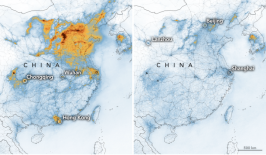On August 22nd 2020, humans will have used up Earth’s resource budget for the entire year – a significant improvement when compared to 2019, where Earth Overshoot Day was on July 29th. But while it might seem like a reason to celebrate, the situation is a lot more complex than it appears at first glance.
Earth Overshoot Day is the date each year when humanity’s demand on nature exceeds the Earth’s regenerative capacity. The Global Footprint Network announced today that the date for 2020 will be August 22nd.
This is 25 days later than in 2019, interrupting the trajectory we’ve seen over the past 50 years. The dramatic and sudden change (our global carbon footprint is estimated to have dropped a whole 14.5 percent) comes as a result of the lockdowns following the coronavirus pandemic.
The date is calculated using UN data and a range of other sources including the International Energy Agency. They add yields generated from agriculture, grazing land, forests, fisheries, and carbon uptake to establish world biocapacity, which they then divide by our total footprint in each of these areas.
With a few exceptions, which track more or less with previous recessions, the date each year has been getting earlier – although the rate at which it has been doing so has slowed in the past ten years.
Whether this slowed rate is due to a slight relative decoupling of resource use and economic growth, or simply to the anaemic global recovery since the 2008 recession, is hard to say. Either way it is clear that we are still a long way from achieving a sustainable economy. Even with this year’s dramatic reductions in economic activity, humanity will still use 60% more resources than the Earth’s regenerative capacity, meaning we would need 1.6 Earths to sustain us at our 2020 rate of resource use in the long-term.
And for every year we overshoot, we are building up ecological debt and the Earth’s regenerative capacity is decreasing. This means that even if our resource use remains constant the overshoot date the following year will move earlier. A reduction in resource use in absolute terms is imperative.
When we take into account global inequality, the challenge facing us becomes even more acute. Every developed economy is currently using (often several times) more resources than their national biocapacities to meet the demands of their citizens. This means that if we want to have any chance of eradicating poverty in poorer countries without moving forward the date of Overshoot Day in future, we must reduce resource use in high-income economies in the Global North even more drastically.
While the lockdowns and subsequent economic downturn have no doubt contributed to the later Earth Overshoot Day this year, it remains to be seen what long-term impacts will result. It is very possible that we will revert back to unsustainable business-as-usual growth strategies. The recent bailouts of Lufthansa and American Airlines are just two examples of the old order trying to re-establish itself. However, there have been some promising developments which suggest that change could be more long-lasting. Corona has taken a huge toll on the coal industry, for instance, while renewables have continued to grow.
The announcement of the postponed Earth Overshoot Day in the midst of the pandemic suddenly makes saving the planet appear slightly more within our reach. Our response to the coronavirus has shown us that it is possible to make dramatic shifts in our way of life, and that governments, businesses and individuals are capable of acting swiftly when our future is on the line. Let’s not waste this window of opportunity!






